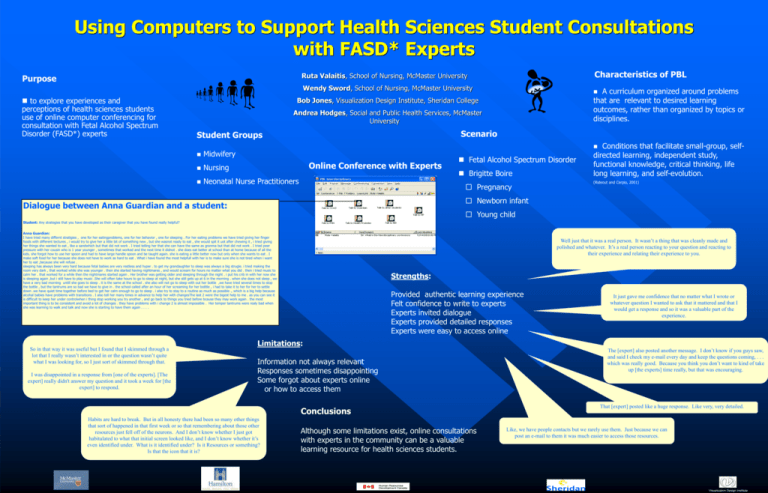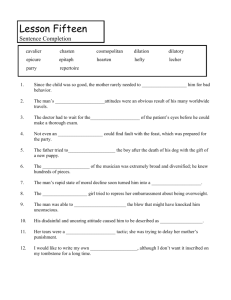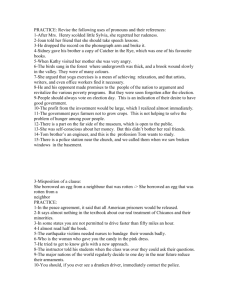Using Computers to Support Health Sciences Student Consultations
advertisement

Using Computers to Support Health Sciences Student Consultations with FASD* Experts Characteristics of PBL Ruta Valaitis, School of Nursing, McMaster University Purpose Wendy Sword, School of Nursing, McMaster University to explore experiences and perceptions of health sciences students use of online computer conferencing for consultation with Fetal Alcohol Spectrum Disorder (FASD*) experts A curriculum organized around problems that are relevant to desired learning outcomes, rather than organized by topics or disciplines. Bob Jones, Visualization Design Institute, Sheridan College Andrea Hodges, Social and Public Health Services, McMaster University Scenario Student Groups Conditions that facilitate small-group, selfdirected learning, independent study, functional knowledge, critical thinking, life long learning, and self-evolution. Midwifery Nursing Neonatal Nurse Practitioners Online Conference with Experts Fetal Alcohol Spectrum Disorder Brigitte Boire Pregnancy (Rideout and Carpio, 2001) Newborn infant Dialogue between Anna Guardian and a student: Young child Student: Any strategies that you have developed as their caregiver that you have found really helpful? Anna Guardian: I have tried many differnt stratigies , one for her eatingproblems, one for her behavior , one for sleeping . For her eating problems we have tried giving her finger foods with different tectures , i would try to give her a little bit of something new , but she wasnot ready to eat , she would spit it uot after chewing it , i tried giving her things she wanted to eat , like a sandwhich but that did not work . I tried telling her that she can have the same as granma but that did not work . I tried peer pressure with her cousin who is 1 year younger , sometimes that worked and the next time it didnot . she does eat better at school than at home because of all the kids. she forgot how to use her spoon and had to have large handle spoon and be taught again. she is eating a little better now but only when she wants to eat . I make soft food for her because she does not have to work as hard to eat . What i have found the most helpfull with her is to make sure she is not tired when i want her to eat ,because she will refuse . sleeping has always been very hard because fetal babies are very restless and hyper . to get my grandaughter to sleep was always a big strugle. i tried making the room very dark , that worked while she was younger . then she started having nightmares , and would scream for hours no matter what you did . then i tried music to calm her . that worked for a while then the nightmares started again . Her brother was getting older and sleeping through the night . i put his crib in with her now she is sleeping again ,but i still have to play music .She will often take hours to go to sleep at night, but she still gets up at 6 in the morning . when she does not sleep , we have a very bad morning untill she goes to sleep . it is the same at the school . she also will not go to sleep with out her bottle ,we have tried several times to stop the bottle , but the tantrums are so bad we have to give in . the school called after an hour of her screaming for her botltle , i had to take it to her for her to settle down .we have quiet time together before bed to get her calm enough to go to sleep . i also try to stay to a routine as much as possible ., which is a big help because alcohal babies have problems with transitions . I also tell her many times in advance to help her with changesThe last 2 were the bigest help to me . as you can see it is difficult to keep her under controlwhen i thing stop working you try another , and go back to things you tried before bcause they may work again . the most important thing is to be consistent and avoid a lot of changes . they have problems with i change 2 is almost impossible . Her temper tantrums were realy bad when she was learning to walk and talk and now she is starting to have them again . . . . So in that way it was useful but I found that I skimmed through a lot that I really wasn’t interested in or the question wasn’t quite what I was looking for, so I just sort of skimmed through that. I was disappointed in a response from [one of the experts]. [The expert] really didn't answer my question and it took a week for [the expert] to respond. Well just that it was a real person. It wasn’t a thing that was cleanly made and polished and whatever. It’s a real person reacting to your question and reacting to their experience and relating their experience to you. Strengths: Provided authentic learning experience Felt confidence to write to experts Experts invited dialogue Experts provided detailed responses Experts were easy to access online Limitations: Information not always relevant Responses sometimes disappointing Some forgot about experts online or how to access them Conclusions Habits are hard to break. But in all honesty there had been so many other things that sort of happened in that first week or so that remembering about those other resources just fell off of the neurons. And I don’t know whether I just got habitulated to what that initial screen looked like, and I don’t know whether it’s even identified under. What is it identified under? Is it Resources or something? Is that the icon that it is? Although some limitations exist, online consultations with experts in the community can be a valuable learning resource for health sciences students. It just gave me confidence that no matter what I wrote or whatever question I wanted to ask that it mattered and that I would get a response and so it was a valuable part of the experience. The [expert] also posted another message. I don’t know if you guys saw, and said I check my e-mail every day and keep the questions coming, . . . which was really good. Because you think you don’t want to kind of take up [the experts] time really, but that was encouraging. That [expert] posted like a huge response. Like very, very detailed. Like, we have people contacts but we rarely use them. Just because we can post an e-mail to them it was much easier to access those resources. Visualization Design Institute





